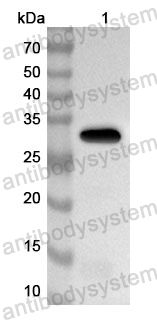Catalog No.
PHN14701
Species reactivity
Human
Host species
Rabbit
Isotype
IgG
Clonality
Polyclonal
Immunogen
E. coli - derived recombinant Human MR1 (Arg23-Pro292).
Tested applications
ELISA: 1:4000-1:8000, IHC: 1:50-1:100, WB: 1:1000-1:4000
Target
Class I histocompatibility antigen-like protein, MR1, MHC class I-related gene protein, Major histocompatibility complex class I-related gene protein
Purification
Purified by antigen affinity column.
Accession
Q95460
Applications
ELISA, IHC, WB
Form
Liquid
Storage buffer
0.01M PBS, pH 7.4, 50% Glycerol, 0.05% Proclin 300.
Stability and Storage
Use a manual defrost freezer and avoid repeated freeze thaw cycles. Store at 2 to 8°C for frequent use. Store at -20 to -80°C for twelve months from the date of receipt.
Comparison of B lymphocyte profile between membranous nephropathy and idiopathic nephrotic syndrome pediatric patients., PMID:40122944
Omics data integration analysis identified new biological insights into chronic antibody-mediated rejection (CAMR)., PMID:39979925
MR1 presents vitamin B6-related compounds for recognition by MR1-reactive T cells., PMID:39589872
Protective effect of TCR-mediated MAIT cell activation during experimental autoimmune encephalomyelitis., PMID:39468055
Characterization of Tumor-Infiltrating Lymphocyte-Derived Atypical TCRs Recognizing Breast Cancer in an MR1-Dependent Manner., PMID:39451228
Structure of a fully assembled γδ T cell antigen receptor., PMID:39146975
The effect of redox bacteria on the programmed cell death-1 cancer immunotherapy., PMID:39035583
Treatment of a MyD88 inhibitor alleviates rejection and inflammation in xenotransplantation by inhibiting dendritic cells activation and trained immunity in macrophages., PMID:38377850
Innate TCRβ-chain engagement drives human T cells toward distinct memory-like effector phenotypes with immunotherapeutic potentials., PMID:38055824
Mucosal-associated invariant T cells contribute to suppression of inflammatory myeloid cells in immune-mediated kidney disease., PMID:37968302
Human in vitro-induced IL-17A+ CD8+ T-cells exert pro-inflammatory effects on synovial fibroblasts., PMID:37367825
Microbial synthesis of Prussian blue for potentiating checkpoint blockade immunotherapy., PMID:37221237
Suppression of MR1 by human cytomegalovirus inhibits MAIT cell activation., PMID:36845106
Cross-Regulation of F-Box Protein FBXL2 with T-bet and TNF-α during Acute and Chronic Lung Allograft Rejection., PMID:36113884
Mucosal-Associated Invariant T Cells in T-Cell Non-Hodgkin Lymphomas: A Case Series., PMID:35740587
TAPBPR employs a ligand-independent docking mechanism to chaperone MR1 molecules., PMID:35725941
Low-dose IL-2 prevents murine chronic cardiac allograft rejection: Role for IL-2-induced T regulatory cells and exosomes with PD-L1 and CD73., PMID:35603986
MAIT cell compartment characteristics are associated with the immune response magnitude to the BNT162b2 mRNA anti-SARS-CoV-2 vaccine., PMID:35562666
Magnetic Resonance Image in Monitor and Diagnosis of Patients with Neuromyelitis Optica., PMID:35360267
A bibliometric review of peripartum cardiomyopathy compared to other cardiomyopathies using artificial intelligence and machine learning., PMID:35340600
Bile from Patients with Primary Sclerosing Cholangitis Contains Mucosal-Associated Invariant T-Cell Antigens., PMID:35063408
Recognition of the antigen-presenting molecule MR1 by a Vδ3+ γδ T cell receptor., PMID:34845016
Mucosal-Associated Invariant T (MAIT) Cell Dysfunction and PD-1 Expression in Prostate Cancer: Implications for Immunotherapy., PMID:34737749
Exhaustion in tumor-infiltrating Mucosal-Associated Invariant T (MAIT) cells from colon cancer patients., PMID:33885944
Seroprevalence of Measles, Rubella, Tetanus, and Diphtheria Antibodies among Children in Haiti, 2017., PMID:32618256
Mucosal-associated invariant T (MAIT) cells provide B-cell help in vaccinated and subsequently SIV-infected Rhesus Macaques., PMID:32572140
The MAIT TCRβ chain contributes to discrimination of microbial ligand., PMID:32568415
Expression dynamics of integrin α2, α3, and αV upon osteogenic differentiation of human mesenchymal stem cells., PMID:32493499
Opsonization-Enhanced Antigen Presentation by MR1 Activates Rapid Polyfunctional MAIT Cell Responses Acting as an Effector Arm of Humoral Antibacterial Immunity., PMID:32434941
Donor-Specific Regulatory T Cell-Mediated Immune Tolerance in an Intrahepatic Murine Allogeneic Islet Transplantation Model with Short-Term Anti-CD154 mAb Single Treatment., PMID:32216448
MAIT Cells Promote Tumor Initiation, Growth, and Metastases via Tumor MR1., PMID:31826876
Magnetic Bead-Based Enrichment of Murine MAIT Cells., PMID:31792830
Human MAIT Cell Activation In Vitro., PMID:31792818
In Situ Detection of MAIT Cells and MR1-Expressing Cells in Tissue Biopsies Utilizing Immunohistochemistry., PMID:31792817
Characterization of Human Mucosal-associated Invariant T (MAIT) Cells., PMID:31763790
Characterization and Purification of Mouse Mucosal-Associated Invariant T (MAIT) Cells., PMID:31763782
The T cell receptor (TRA) locus in the rabbit (Oryctolagus cuniculus): Genomic features and consequences for invariant T cells., PMID:31355919
Blockade of CD40-CD154 pathway interactions suppresses ectopic lymphoid structures and inhibits pathology in the NOD/ShiLtJ mouse model of Sjögren's syndrome., PMID:30902822
Molecular cloning and characterization of the pig MHC class Ⅰ-related MR1 gene., PMID:30836125
Antibody opsonization enhances MAIT cell responsiveness to bacteria via a TNF-dependent mechanism., PMID:30695101
A novel MyD88 inhibitor attenuates allograft rejection after heterotopic tracheal transplantation in mice., PMID:30472390
Transfused platelets enhance alloimmune responses to transfused KEL-expressing red blood cells in a murine model., PMID:30418129
Role of CD1d- and MR1-Restricted T Cells in Asthma., PMID:30210497
C5aR1 regulates migration of suppressive myeloid cells required for costimulatory blockade-induced murine allograft survival., PMID:30106232
Human MAIT cells are rapidly activated by Aspergillus spp. in an APC-dependent manner., PMID:30059139
Neutralization of CD40 ligand costimulation promotes bone formation and accretion of vertebral bone mass in mice., PMID:29522194
Differences in C-type lectin receptors and their adaptor molecules in the peritoneal fluid of patients with endometriosis and gynecologic cancers., PMID:29511377
Longitudinal assessment of HLA and MIC-A antibodies in uneventful pregnancies and pregnancies complicated by preeclampsia or gestational diabetes., PMID:29051520
Human mucosal-associated invariant T (MAIT) cells possess capacity for B cell help., PMID:28807929
Silica microparticles for sustained zero-order release of an anti-CD40L antibody., PMID:28752299

